Guild Wars is an online role-playing game series developed by ArenaNet and published by NCSOFT. The games were critically well received and won many editor's choice awards, as well as awards such as Best Value, Best Massively Multiplayer Online Role-Playing Game (MMORPG), and Best Game. Guild Wars was noted for being the "first major MMO to adopt a business model not based on monthly subscription fees", its instanced approach to gameplay, and the quality of the graphics and play for computers with low specifications. In April 2009, NCSoft announced that 6 million units of games in the Guild Wars series had been sold. The sequel, Guild Wars 2, was announced in March 2007 and released on August 28 2012. It features updated graphics and gameplay mechanics, and continues the original Guild Wars tradition of no subscription fees. The Guild Wars series had sold 11.5 million copies by August 2015.

Tibia is a 1997 massively multiplayer online role-playing game (MMORPG) developed and published by CipSoft. It is one of the earliest and longest-running MMORPGs, with a popularity that peaked in 2007. It is a free game to download and play, though players may pay to upgrade to a premium account, granting substantial in-game benefits. Tibia is a two-dimensional tile-based game set in a fantasy world with pixel art graphics and a top-down perspective.

Champions of Norrath: Realms of EverQuest is an action role-playing video game for the PlayStation 2, set in the EverQuest universe. It is playable with one single player or cooperative for up to four players. However, with a Network Adapter, players can take the game online with others and kill others or join to form groups of adventurers. The game uses a re-worked and expanded Baldur's Gate: Dark Alliance game engine. A sequel was created called Champions: Return to Arms which was released in February 2005.
The monk is a character class in a number of role-playing tabletop and video games. In those games which follow the Dungeons & Dragons traditions, monks are characters with excellent martial arts skills and who specialize in unarmed, unarmored combat.

Mabinogi is a massively multiplayer online role-playing game released by Nexon, and developed by devCAT studio. The name of the game is taken from the Mabinogion, a Welsh anthology of legend, and the settings for the game are loosely based on Welsh mythology.

Children of Mana is a 2006 action role-playing game for the Nintendo DS handheld console. It was developed by Square Enix and Nex Entertainment, and published by Square Enix and Nintendo. It is the sixth game of the Mana series—following 2003's Sword of Mana—and the first entry in the World of Mana subseries. Set in a high fantasy universe, Children of Mana follows one of four young heroes as they combat an invasion of monsters and learn about the cataclysmic event that killed their families.
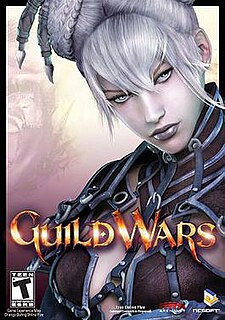
Guild Wars is a multiplayer online action role-playing game developed by ArenaNet, a subsidiary of South Korean game publisher NCSOFT. As the original installment of the Guild Wars series, its campaign was retroactively titled Prophecies to differentiate it from the content of subsequent releases. The game contains a co-operative role-playing portion and a competitive Player versus Player (PvP) portion. In PvP, players may use either their co-operative characters or PvP-exclusive characters who are inherently maximum level and have account-based access to unlocked content.
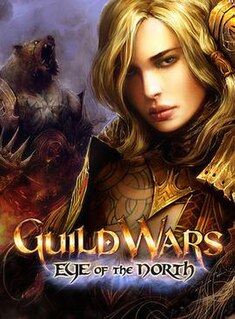
Guild Wars: Eye of the North is an expansion pack to the Action role-playing game Guild Wars by ArenaNet, a subsidiary of NCSOFT. It was released worldwide on August 31, 2007. Unlike other games in the Guild Wars sequence, Eye of the North requires players to own one of the earlier three campaigns. It features no tutorial content and is intended for characters that have reached level 10 or higher.

Monato Esprit is a 3D, fantasy-themed massively multiplayer online role-playing game. The game is currently in the open beta stage of development and is tentatively scheduled for release in July, 2009. Monato Esprit is free to download and uses the e-currency "MetaTIX" as its billing system.
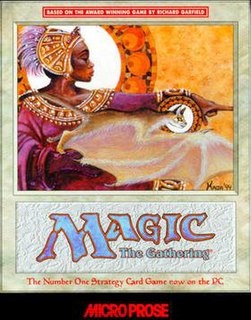
Magic: The Gathering is a video game published by MicroProse in April 1997 based on the collectible card game Magic: The Gathering. It is often referred to as Shandalar after the plane of Shandalar, where the game takes place. The player must travel the land and fight random enemies to gain cards, and defeat five wizards representing the five colors. The player must prevent one color from gaining too much power, and defeat the planeswalker Arzakon, who has a deck of all five colors. Adventure game and role-playing game elements are present, including inventory, gold, towns, dungeons, random battles, and character progression in the form of new abilities and a higher life point total. An oversized version of Aswan Jaguar was included in the game box.
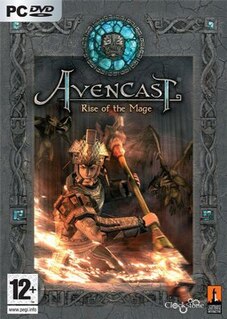
Avencast: Rise of the Mage is an action role-playing game for Microsoft Windows developed by ClockStone and published by Lighthouse Interactive. The game heavily borrows elements of beat 'em ups. This is apparent from the ability to cast spells by rapidly combining movement inputs with mouse buttons. Alternatively short cuts can be assigned for easy access of spells. Also the scheme of recurring Boss fights reflects this relation. The inclusion of riddles shows the connection to adventure games.
The game of World of Warcraft, or WoW, is set in a fictional world known as Azeroth and in the expansion The Burning Crusade extended the game to another world called Outland. The expansion Wrath of the Lich King added Northrend, the frigid northern continent of Azeroth. In the expansion Cataclysm, the classic continents of Azeroth were drastically changed as some zones were destroyed and new ones were unveiled. The expansion Mists of Pandaria added the southern continent, previously hidden behind a perennial mist cover, Pandaria. The expansion, Warlords of Draenor added Draenor, which is an Outland was before its partial destruction. The expansion Legion adds the Broken Isles, an island chain near the Maelstrom in the middle of the Great Sea, and the damaged planet Argus, the headquarters of the Burning Legion. The latest expansion Battle for Azeroth adds 2 new continents to the center of the map of Azeroth and introduces 8 new races called Allied Races.

Diablo: Hellfire is the expansion pack for the video game Diablo, developed by Synergistic Software, a Sierra division, and published by Sierra On-Line in 1997. Despite the objections of Blizzard Entertainment, the Hellfire expansion was produced, permitted by Davidson & Associates, their parent company at the time. Blizzard North, who was developing the sequel Diablo II, thus imposed numerous restrictions upon Synergistic Software's development of Hellfire.

Flyff is a fantasy MMORPG by Korean development company Gala Lab.

Rappelz is a free-to-play massively multiplayer online role-playing game. The game is developed by the Korean company Gala Lab, formerly nFlavor. It is published in Europe and North America by Webzen, Inc. in English, French, German, Italian, Polish and Turkish. As of October 2008, Rappelz was also being published by the South East Asia based game publishing company AsiaSoft as RappelzSEA, but was later dropped by the company on 1 September 2009. The game was also published in Arabic for MENA gamers by the Emirati company Game Power 7. The game was released under a different title known as Hope of Nations, and was commercially launched on 16 March 2009. A new version was released 15 July 2010 by EagleGame in the Philippines, but the PH/SEA version closed in 2016. As of 6 February 2013 it was confirmed by Rappelz GMs that "Gala Net, Inc. and its subsidiaries Gala Networks Europe and Gala-net Brazil have been acquired by Webzen, Inc.", however it is still being developed by Gala Labs and Gala Japan

Elsword is a free-to-play, 2.5D action MMORPG developed by the South Korean company KOG Studios. It features real-time action gameplay and includes both player vs. environment and player vs. player modes. There are thirteen playable characters within the game, each with unique backstories and distinct abilities. While playing the game is free, some items and costumes can be purchased through an in-game "Item Mall" using real currency. The game was originally made with the intention of being the spiritual successor to Grand Chase by upgrading the graphics from 2D to 2.5D.
Pocket Legends is an iOS and Android mobile 3D MMO developed by Spacetime Studios. It has variously been described as the first cross-platform, mobile 3D MMO. Since 2012, no new expansions are released as the player base has shrunk due to the company's focus on the launch of new titles.
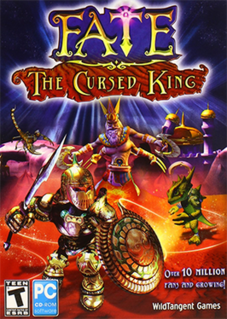
Fate: The Curse King is a computer game that was developed and published by WildTangent. The game was available to play on WildTagnent on March 30, 2011 and available for purchase on Steam on November 19, 2014. Fate: the Cursed King is the fourth and final installment in the Fate series that started in 2005. The release of Fate: The Cursed King was well received by both gamer and critic alike. The game scored a 9/10 on Steam and a 4.4/5 on WildTagent's own platform. Critics have referred to it as the "FATE-IEST of the FATE games". The game was rated E for everyone years 10 and older.

Echo of Soul is a massively multiplayer online role-playing game developed by Korean game developer Nvius and published in North America and Europe by Aeria Games.

Twenty-six full expansions for the MMORPG EverQuest have been released. Expansions are purchased separately from the original game and each other and provide additional content to the game. Additionally, the game is updated through downloaded patches.















